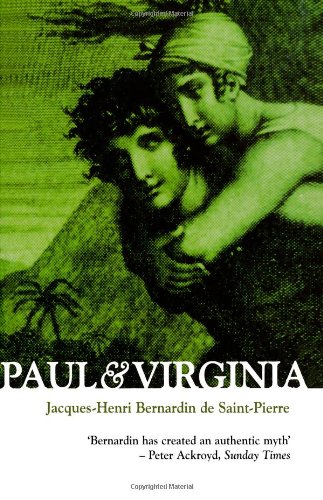Background
He was born on January 19, 1737, in France.



( First published in 1788, this is the classic of naive l...)
First published in 1788, this is the classic of naive love that inspired the film The Blue Lagoon. Jacques-Henri Bernardin de Saint-Pierre's only novel is a classic of naïve love. First published in 1788 to wide acclaim, it subsequently appeared in hundreds of editions throughout the world and influenced a generation of French writers, from George Sand and Lamartine to Balzac and Flaubert. In modern times it has inspired major musicals, artworks, a hit song by Celine Dion, and even a chain of luxury hotels on Mauritius. Bernardin was inspired by his friend Rousseau to tell the story of two children who grow up entirely according to nature's laws on an idyllic island free from the corrupting influence of the world. They reach adolescence and fall in love, but tragedy strikes and both die untimely deaths. A key text in the development of the novel, this is a must for anyone interested in the history of European literature.
http://www.amazon.com/gp/product/0720612314/?tag=2022091-20

(Ce livre est une oeuvre du domaine public éditée au forma...)
Ce livre est une oeuvre du domaine public éditée au format numérique par Norph-Nop. Lachat de lédition Kindle inclut le téléchargement via un réseau sans fil sur votre liseuse et vos applications de lecture Kindle
http://www.amazon.com/gp/product/B005R93MWC/?tag=2022091-20
He was born on January 19, 1737, in France.
He was educated at Caen and at Rouen, and became an engineer.
According to his own account he served in the army, taking part in the Hesse campaign of 1760, but was dismissed for insubordination, and, after quarrelling with his family, was in some difficulty. He appears at Malta, St Petersburg, Warsaw, Dresden, Berlin, holding brief commissions as an engineer and rejoicing in romantic adventures. But he came back to Paris in 1765 poorer than he set out. He came into possession of a small sum at his father's death, and in 1768 he set out for the Isle of France (Mauritius) with a government commission, and remained there three years, returning home in 1771. These wanderings supplied Bernardin with the whole of his stock-in-trade, for he never again quitted France. On his return from Mauritius he was introduced to D'Alembert and his friends, but he took no great pleasure in the company of any literary man except J. J. Rousseau, of whom in his last years he saw much, and on whom he formed both his character and his style. His Voyage d I'lie de France (2 vols. , 1773) gained him a reputation as a champion of innocence and religion, and in consequence, through the exertions of the bishop of Aix, a pension of 1000 livres a year. It is soberest and therefore the least characteristic of his books. The Etudes de la nature (3 vols. , 1784) was an attempt to prove the existence of God from the wonders of nature; he set up a philosophy of sentiment to oppose the materializing tendencies of the Encyclopaedists. His masterpiece, Paul et Virginie, appeared in 1789 in a supplementary volume of the Etudes, and his second great success, much less sentimental and showing not a little humour, the Chaumiire indienne, not till 1790. For a short time in 1792 he was superintendent of the Jardin des Plantes, and on the suppression of the office received a pension of 3000 livres. In 1795 he became a member of the Institute.
His merit lies in his breaking away from the arid vocabulary which more than a century of classical writing has brought upon France, in his genuine preference for the beauties of nature, and in his attempt to describe them faithfully. After Rousseau, and even more than Rousseau, Bernardin was in French literature the apostle of the return to nature, though both in him and his immediate follower Chateaubriand there is still much mannerism and unreality.
Aime Martin, disciple of Bernardin and the second husband of his second wife, published a complete edition of his works in 18 volumes(Paris, 1818 - 1820), afterwards increased by seven volumes of correspondence and memoirs (1826).
( First published in 1788, this is the classic of naive l...)
(Ce livre est une oeuvre du domaine public éditée au forma...)
Quotations:
"Patience is the courage of virtue. "
"Death, my son, is a good thing for all men; it is the night for this worried day that we call life. It is in the sleep of death that finds rest for eternity the sickness, pain, desperation, and the fears that agitate, without end, we unhappy living souls. "
"A tomb is a monument placed on the limits of two worlds. "
In 1792 he married a very young girl, Felicite Didot, who brought him a considerable dowry. After his first wife's death he married in 1800, when he was sixty-three, another young girl, Desiree Pelleport, and is said to have been very happy with her.
